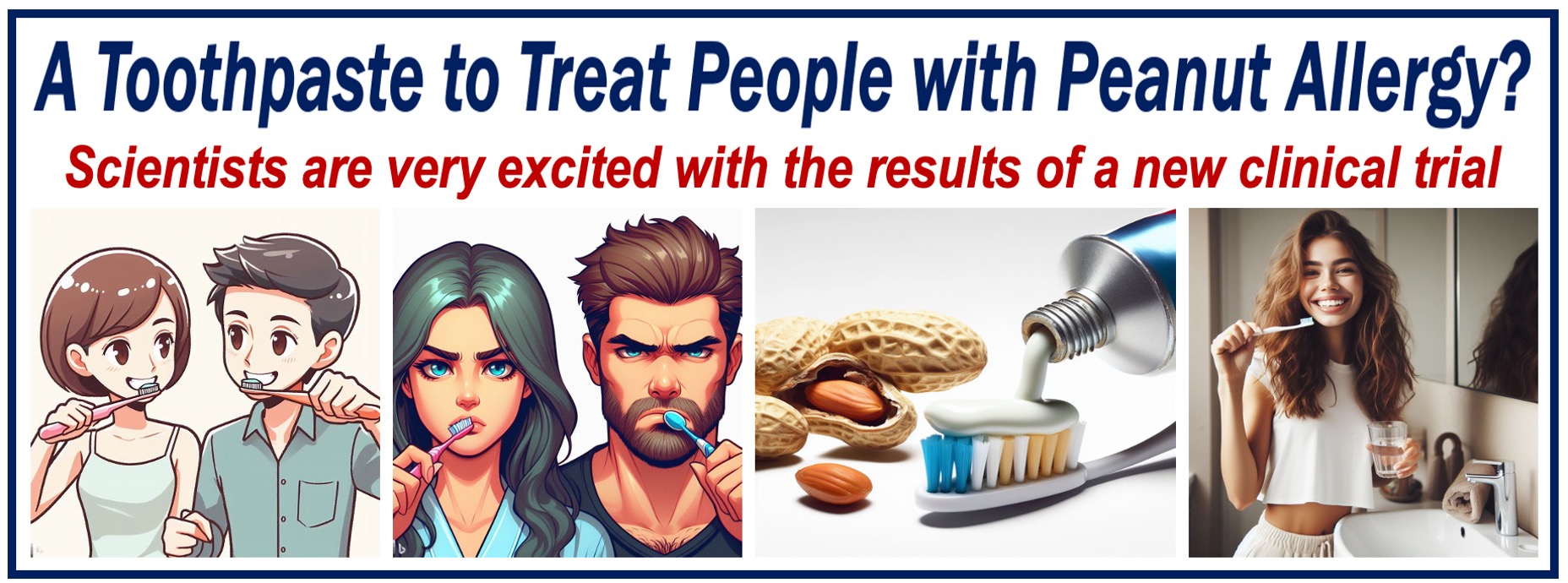Scientists at Intrommune Therapeutics, Inc. have created a new toothpaste that may help adults with severe peanut allergies. The toothpaste has the potential to prevent severe reactions to peanuts.
Intrommune Therapeutics Inc. (Intrommune), a biotechnology company, is based in New York City.
Double-blind clinical trial
Thirty-two adult volunteers were involved in an early-stage, *double-blind, placebo-controlled clinical trial. They all had peanut allergies. The study tested whether they could brush their teeth safely with a special toothpaste which contained trace amounts of peanut protein.
* In a double-blind trial, neither participants nor researchers know who receives the treatment or placebo, eliminating bias and ensuring objective results.

Of the 32 participants, eight used a toothpaste with a placebo while 24 used the toothpaste infused with peanut protein.
The researchers wanted to find out whether an allergic person’s immune system would get used to an allergen if they were exposed to tiny amounts of it over time. If so, their allergic reactions would become less severe.
The volunteers in the trial brushed their teeth for two minutes each day for 11 months using the special toothpaste. The researchers gradually increased the amount of peanut protein in the toothpaste over the course of 4 months. By the end of the trial, they were being exposed to the equivalent of about one-third of a peanut kernel.
Toothpaste shows promise
The results were impressive. According to an Intrommune press release:
“The study showed that 100% of those treated with the toothpaste consistently tolerated the pre-specified protocol highest dose. No moderate nor severe systemic reactions occurred in participants undergoing treatment.”
“Non-systemic adverse reactions were mostly local, such as oral itching, mild, and transient. Adherence to treatment reached 97% with no dropouts due to the study medication.”
In other words, none of the study participants experienced anaphylaxis. Anaphylaxis is a severe allergic reaction which may be life-threatening.
The researchers pointed out that the study did not test the treatment’s effectiveness. It focused on its safety. Even so, early indications suggest that it could help severely allergic people, i.e., it could prevent anaphylaxis.
The trial results were presented at the annual meeting of the American College of Allergy, Asthma and Immunology in Anaheim, California on 9th November (Thursday).
The research team says that the toothpaste is much easier to administer than current treatment for allergies to weeds, and grass, which involve injections.
Dr William Berger, lead author, said:
“Patients do not have to do anything other than brush their teeth. We think it will provide better protection because the patient will be taking their treatment on a regular basis without any interruptions.”
About peanut allergy
“Peanut allergy is one of the most dangerous food allergies and one of the least likely to be outgrown. In Western countries, the incidence of peanut allergy is between 1.5% and 3%. There has been a sudden increase in the number of cases in the early 21st century.”
In the US, 0.6% of people have a peanut allergy. In England, 4,000 people are diagnosed with a peanut allergy each year.
Some people with a peanut allergy may have a reaction if they are exposed to as little as 1/200th of a single peanut. A report by the Government of New South Wales in Australia states that for people with a known peanut allergy, a reaction can be triggered when exposed to between a tiny fragment and two whole peanuts.
